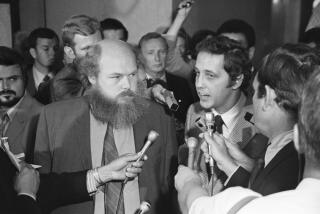John Hughes dies at 59; writer-director of ‘80s teen films
- Share via
John Hughes, the influential writer-director who captured the humor and angst of the teen experience, 1980s style, in hit movies such as “Sixteen Candles,” “The Breakfast Club” and “Ferris Bueller’s Day Off,” died Thursday. He was 59.
Hughes, who maintained a working farm in Northern Illinois and distanced himself from Hollywood more than a decade ago, died of a heart attack during a morning walk in Manhattan while visiting family in New York, spokeswoman Michelle Bega said.
A onetime ad man and National Lampoon writer, Hughes became a king of comedy in the 1980s as a teen-movie auteur who understood what it meant to be an adolescent with a penchant for outcasts and geeks.
“I am truly shocked and saddened by the news about my old friend John Hughes,” actor Matthew Broderick, who played the title role in the 1986 comedy “Ferris Bueller’s Day Off,” said Thursday. “He was a wonderful, very talented guy and my heart goes out to his family.”
Actor Macaulay Culkin, who starred in the 1990 Hughes-written comedy “Home Alone,” said, “I was a fan of both his work and a fan of him as a person. The world has lost not only a quintessential filmmaker whose influence will be felt for generations, but a great and decent man.”
Hughes already had written the hit comedies “Mr. Mom” and National Lampoon’s “Vacation” when he made his debut as a writer-director with “Sixteen Candles,” the 1984 film starring Molly Ringwald as a high school girl whose parents forget that it’s her 16th birthday.
Ringwald was among the young actors and actresses -- dubbed the Brat Pack -- who gained fame in Hughes’ movies, including Anthony Michael Hall, Ally Sheedy, John Cusack, Emilio Estevez, Robert Downey Jr. and Judd Nelson.
Saying she was “stunned and incredibly sad” to hear of Hughes’ death, Ringwald said in a statement that he “was and will always be such an important part of my life. He will be missed -- by me and by everyone that he has touched.”
In a 1985 interview with Chicago Tribune movie critic Gene Siskel, Hughes said that many filmmakers “portray teenagers as immoral and ignorant with pursuits that are pretty base. They seem to think that teenagers aren’t very bright. But I haven’t found that to be the case. I listen to kids. I respect them. I don’t discount anything they have to say just because they’re only 16 years old.”
Although Hughes’ films often played teenage travails as both high drama and farce, his characters were emotionally honest and instantly recognizable to audiences.
The young people in his movies were usually painfully self-aware, often sounding more like adults when discussing their social status and the hierarchies of high school, and his unique take on adolescence influenced a generation of writers and directors.
Comedy writer-director Judd Apatow told The Times in 2008: “John Hughes wrote some of the great outsider characters of all time. It’s pretty ridiculous to hear people talk about the movies we’ve been doing, with outrageous humor and sweetness all combined, as if they were an original idea. I mean, it was all there first in John Hughes’ films.”
Apatow said in a statement Thursday that he felt “like a part of my childhood has died. Nobody made me laugh harder or more often than John Hughes.”
In writing about Hughes in 1999, film critic Elvis Mitchell wrote: “No one before him had created a body of work that treated adolescent crisis as if it were a tragedy disrupting the world as the millennium nears.
“His balance of sophistication and cruelty, scored with the smartest use of contemporary music a director has ever brought to his pictures on a consistent basis, played ever so brilliantly to an audience who felt it had never seen its own stories on the screen before.”
Hughes’ other credits as a writer-director include “Weird Science,” “Planes, Trains & Automobiles,” “She’s Having a Baby,” “Uncle Buck” and -- in 1991, his final film as a director -- “Curly Sue.”
Among Hughes’ credits as a writer are “Pretty in Pink,” “Some Kind of Wonderful,” “Christmas Vacation,” “Dennis the Menace” and “101 Dalmations.”
Steve Martin, who starred with John Candy in “Planes, Trains & Automobiles,” described Hughes on Thursday as a “great director, but his gift was in screenwriting. He created deep and complex characters, rich in humanity and humor.”
Hughes reportedly moved back to the Chicago area in 1995 and has kept a very low profile since then.
“He’s our generation’s J.D. Salinger,” filmmaker Kevin Smith told The Times this year. “He touched a generation and then the dude checked out.”
Bruce Berman, chairman and CEO of Village Roadshow who was executive in charge of production at Universal and Warner Bros. when he worked with Hughes, said Hughes “quit because he really didn’t like the studio system. All considered, I think he could have stayed as long as he wanted.”
But Berman, who last talked to Hughes a year ago, believes that what kept him in Chicago “is that he made enough money that he didn’t have to deal with Hollywood any more.”
Hughes was born Feb. 18, 1950, in Lansing, Mich. At 13, his family moved to the suburbs of Chicago, where he set many of his movies.
After dropping out of the University of Arizona at age 20, Hughes became an advertising copy writer in Chicago and began writing jokes for Rodney Dangerfield and other comics on the side.
He was a creative director at the Leo Burnett agency when he took a pay cut to accept a job at National Lampoon, where he had been freelancing.
His first screenplay was for National Lampoon’s 1982 comedy “Class Reunion.”
A complete list of Hughes’ surviving family members was not immediately available, but among his survivors are his wife of 39 years, Nancy; his sons, John and James; and four grandchildren.
Times staff writers Susan King and Valerie J. Nelson contributed to this report.
More to Read
Start your day right
Sign up for Essential California for the L.A. Times biggest news, features and recommendations in your inbox six days a week.
You may occasionally receive promotional content from the Los Angeles Times.






